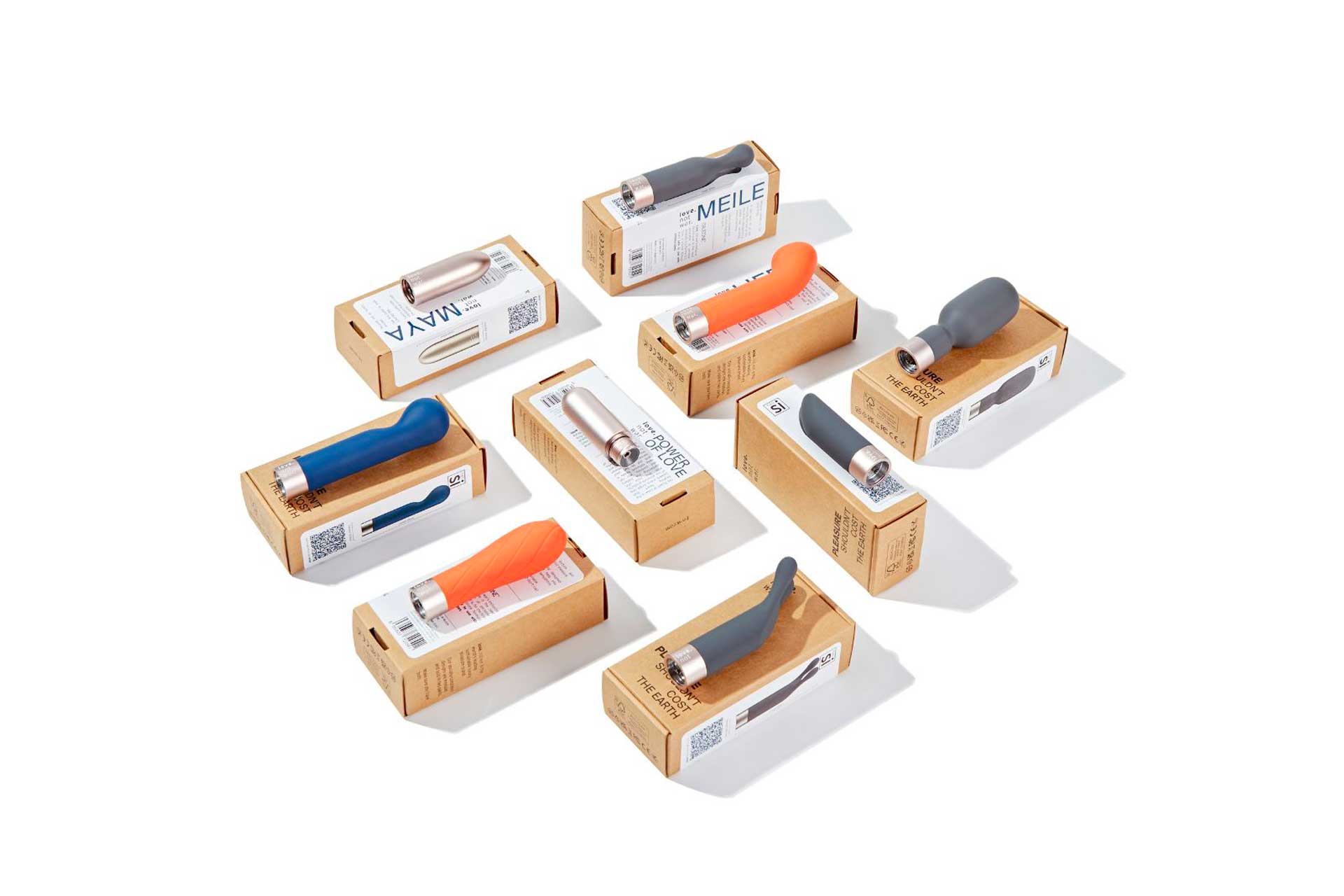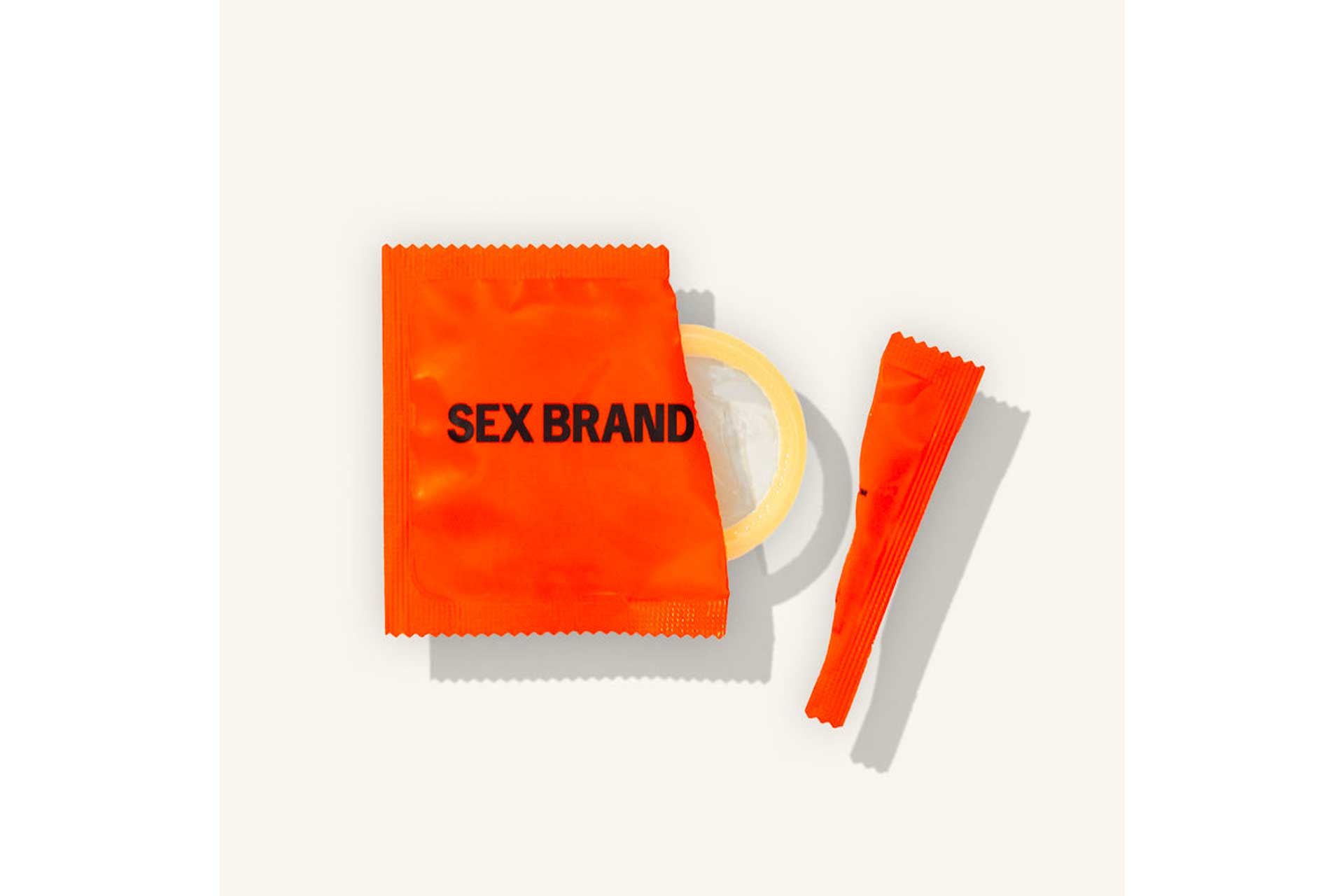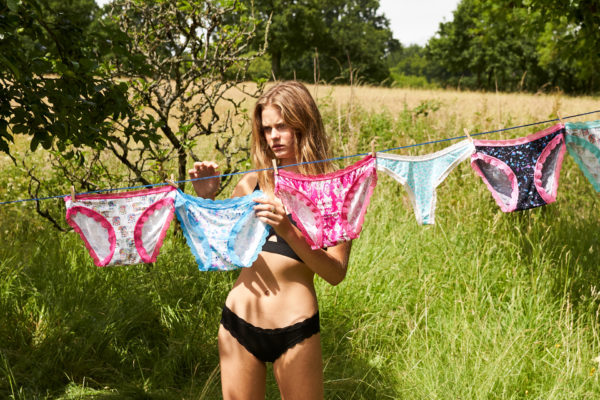How Sustainable Is Your Sex Life?
By
1 year ago
Meet the people in bed with the planet

Do you think about your condoms as farm products? Ever ponder the petroleum in your lubricants? Your sex life might not be so sustainable. Here’s why, plus how to make your sex life kinder to the planet (and hopefully more fun).
Sexy, Sultry And Super Sustainable: Get In Bed With The Planet
‘Before I founded Sex Brand,’ says Jack Gove, ‘I had just begun to pull the threads of the sexual health industry, and I was shocked. Condoms are surprisingly unethical because of the raw material used to make them and the impact they have on the planet.’
Jack Gove is one of the nouveau generation of sexual health and wellness entrepreneurs who aren’t afraid to call it as it is. Namely, they’ll tell you one thing: our sex lives aren’t so clean. The founder of the sustainable condom company is unabashed talking to me about how sex is an essential function of our lives (‘we have to eat, we have to sleep, we have to crap – and we have to shag’). But he’s also upfront that we need change.
It’s possible you’ve not given much thought to the sustainability of your sex life. Why would you? Picking up condoms is a hasty act done while avoiding eye contact with the cashier, careful not to buy anything that might imply a less than sanitary interest in wholesale veg. And lubricants and pleasure toys are ordered online to arrive in hush-hush packaging, designed to be as quiet as possible lest a motorised sound creep escape your walls. It’s also possible you simply don’t want to give it thought – as more and more of our lives face examination (our diets, our travel, our clothes), you might be battling to keep this frontier fun.
But a UN report suggests that we potentially face a global temperature increase of up to 2.9 degrees – much warmer than our optimistic Paris goal of 1.5 degrees – so it’s clear that we need to adapt. Even under the covers. But luckily, say some, this may not hurt the fun factor.
Are Condoms Sustainable?
Condoms are not especially sustainable thanks to the material with which they’re typically made.
‘Around 80 percent of condoms are made of natural latex, which comes from a natural crop in the ground,’ says Jack. ‘Latex are a product of rubber farming.’
‘Rubber farming is one of the worst offending industries in terms of impact on the land, because the demand for rubber is so high across a varied number of goods – mostly car tires and shoes.’
‘This means that the farming has been intensive. Ninety percent of global production is in South East Asia, and over the past 25 years a rainforest area the size of Germany has been cut down for this. And the soil associated with this farming has been degraded due to rubber being a monocrop – which has human consequences as workers are subsequently displaced or lose their incomes.’
Plus, condoms are single-use products (we hope this is not news to you). Nor are they recyclable. This means they’re destined for landfill. The UN estimates that 10 billion latex condoms are made a year; the vast majority of these will end up in landfill. Consider further that they’re often subject to significant additives and chemicals, which reduce their chances of breaking – they’re then non-biodegradable.
The alternative, synthetic latex, is no better – and basically a plastic. ‘Like a balloon,’ says Jack, ‘it’s very slow to break down.’
Condoms are not, therefore, sustainable in their design. Which begs the question: what’s the alternative?
What About Other Contraception?
While users of hormonal birth controls might feel reassured in their minimal throwaway impact, pills or devices that rely on synthetic oestrogen also leave marks on the planet.
Hormones in pills often trickle into our waterways. The impact of this is severe for marine ecosystems. A study of rivers in 2012 by the University of Exeter revealed that Ethinyl estradiol (EE2), one of the main active ingredients in the pill, was affecting the reproduction of fish populations. Scientists found that male fish were producing lower sperm counts, and populations were dwindling in some cases to point of collapse.
The pill’s waste impact doesn’t start at point of manufacture – the oestrogen in our rivers and seas comes from users’ urine (studies have mapped the highest pollution levels against the location of waste-water treatment centres). There is no clear solution to this; manufacturers have resisted suggestions they must clean up the waterways.
And Solo Pleasure?
When sustainable sex toy company Love Not War was founded in 2021 by Will Ranscombe and Rob Scott, it was in the spirit of sustainability. The pair had met while working together at another adult company, so had figured they could apply their expertise to the niche. But Love Not War wasn’t their primary business venture. In reality, their primary business was a factory business which specialised in state-of-the-art bespoke manufacture and design, which woke them up to a vital sector issue around e-waste from sex toys. Manufacturing goods, they said, allowed them to innovate a sector that hadn’t moved in decades.

Love Not War’s complete product range
The options certainly are sparse in terms of eco-bedroom companions. Thinking of a classic bullet or fleshlight, you’re probably most closely going to picture a big plastic thing housed in a bulk of non-recyclable packaging. It’s not clear how many sex toys end up in landfill each year – there does not appear to have been a study – but according to Ann Summers, 75 percent of e-waste (a category under which battery-operated friends fall) is not recycled, adding to an enormous 350 million metric tons of yearly plastic waste.
How these goods are typically manufactured is also suspect. The run-off into water made from plastic production, how much oil and water goes into the production of any plastic good, and the extraction of petroleum for making these goods in the first instance – three among a litany of issues not unique to the manufacture of sex toys but still very much present. Indeed, at the end of their lifecycle, a number of these toys will shed microplastics, too.
For Love Not War, their experience working as manufacturers allowed them to circumvent negative impact on the planet – and this is what, they say, makes them distinct from their competitors. ‘Most companies in this space are not design led – rather, they commission factories in China and market ten or so products really, really well,’ says Will, ‘and the issue then is that these factories don’t care about sustainability.’
‘It was a huge consumer goods segment with basically no nod to the sustainability component,’ says Will, ‘no-one was talking about it, or doing anything about it.’
Lacking Innovation
The problem, Will thought, was that the market hadn’t innovated in decades – despite an increasingly cognisant audience of consumers.
Jack echoes that idea. ‘There were a number of unchallenged incumbents who were enjoying the lay of the land and wanted things to stay the same,’ he says.
It’s a similar story for founder Sarah Welsh who, with Farah Kabir, founded Hanx, the sustainable condom company, in 2017. ‘There were no products that spoke to women,’ she says, ‘and we’d noticed there was a lack of sustainable options. We surveyed the market before we started, and it told us that people were seeking a sustainable brand that was vegan certified. So we knew there was a gap in the market.’
‘And it was really interesting,’ says Sarah, ‘the market hadn’t been innovated for decades – there weren’t really any challenger brands in the UK.’
Meet The Disruptors
One of the significant ways that Love Not War has created an innovative product is through design – a design which considers the entire lifecycle of its product in order to minimise its holistic impact on the earth. The sex toy it offers (and there is only one product on the site) is a modular vibrator made up of two components, a motorised base and interchangeable head. ‘There are only three reasons a vibrator will break – either the electronics go, the motors stop, or the surfaces rips or tears,’ explains Will, ‘and so by keeping our products modular, we repair and recycle only the bits that aren’t working. This immediately cuts the product waste in half, because with any other brand [of vibrator], if one part goes, the entire toy goes to landfill.’
Talking to me, Will is confident that the sustainable option here is significantly better than its less-green peers. In particular, he highlights that modularity, in this case of vibrator heads, provides access to variety at lower cost – once the initial purchase is made, follow-ups are cheaper. In essence, he’s brought the refillable store model of thinking to the sex toy industry.
For Jack, the innovation with Sex Brand was more a material process. ‘We work with a regenerative rubber initiative in Thailand,’ he says, ‘which comprises a cohort of 30 smallholders who have developed a growing technique which cultivates rubber into existing rainforests, as opposed to cutting them down.’
The sustainable option here is once again better. ‘It’s like if you grew an organic tomato: it’d taste better versus its non-organic peer,’ he explains, ‘the rubber that’s grown for these condoms is more premium and therefore feels better – and for a condom, feel matters so much.’
The Right Choice Is More Expensive
One of the challenges that exists within this space is that shoppers have an expectation on price. This isn’t exclusive to the sector – one needs only look at how we consume fashion – but the sexual wellness and health industry has not yet woken up to slower shopping. Nor is there education around this.
‘It is more expensive to produce sustainably,’ says Will, ‘and people expect a Durex bullet for £9.99 in Boots, but to invest in quality and longevity is simply going to be more expensive.’
‘To be honest, the major reason we can do what we do with Love Not War is that we have our own factory. We can access the raw materials at wholesale price.’
Holly Jackson and Kalila Bolton, founders of sexual wellness shop SheSpot, say that the other issue is that it’s still a burgeoning space, so brands are younger – and therefore smaller. ‘It’s expensive to produce sustainable sex toys,’ says Holly, ‘the more environmentally conscious brands are typically dealing with very small budgets, and the minimum order on some of these manufacturing costs are high.’
They draw lessons from the fashion industry. ‘We’d encourage people to invest a little more upfront as you’re then much less likely to need another toy so quickly,’ says Kalila, ‘compare it to cost per wear.’
‘There’s definitely an education piece to be done in the future to kind of say, “this should last you years”,’ says Kalila.
Condoms face the same access issue of price. The more sustainable options appear to be more expensive. A search on Boots places a pack of 12 Durex condoms at £10.99 (91p a unit). A pack of Hanx by contrast is £12.99 for 10 (£1.30 a unit), Sex Brand’s £12.50 for 10 (£1.25 a unit). Roam’s fair rubber condoms are as expensive, £15 for 12 (£1.25 a unit). The additional cost of being kinder in our sex lives begins at 31p a pop.
But again, Jack echoes, it’s something we need to expand our learning on. ‘There’s education to be done on how our condoms are grown,’ he says, ‘people need to start exercising a critical eye on it in the same way we would our food supply chains, or how we examine where our t-shirts are grown and farmed.’

Safety First
The other challenge – a unique one perhaps – is consumer fear.
We fear the safety implications of using more sustainable goods in such a personal way. Will using recycled materials mean we’re putting something unsafe into or around our bodies? Are more eco-condoms more likely to break?
But maybe we should be worried about all toys; this is not a unique issue for sustainable goods.
‘On big sites, you can search “vibrator” and receive 1500 completely unvetted hits. These products could include ingredients that are not body safe,’ says Holly and Kalila, ‘we’ve been shocked by the toys you see go viral on TikTok – some of which have been found to be made of materials that actually biodegrade and decompose inside your body, potentially while you’re using it.’
‘This is a problem with things like lubricants, too, as they’re mostly derived from chemicals and petroleum – with harmful chemicals,’ says Holly, ‘and these are intended for the most intimate part of a woman’s body. Just think about how delicate the microbiome is down there.’
Historically, there’s been a lack of testing and universal certification in the sex toy industry. It’s a choice to seek certification. Love Not War, for example, sends its products off to an external Swiss testing company, and opt for medical grade silicone (prompting the price to rise once again).
‘Although the landscape is changing,’ says Will, ‘there’s an ISO standard coming in, but at the minute most of the industry is basically just self-certifying.’
It’s a different story for condoms. Testing is a legal requirement because condoms are medical devices, so sustainable or not, there’s no compromise on safety.
‘Hanx is CE certified and FDA cleared,’ says Sarah, ‘which is rigorous.’
Sustainability therefore has no impact on the safety of the contraception.
‘We don’t add any chemicals that can affect the biodegradability of our condoms,’ says Sarah, ‘if the product was exposed to light, oxygen and moisture, it would of course decay in the right conditions – but so would a normal latex product. Obviously it’s packaged so it won’t, so unless it’s left out of its foil packaging for three months, the product’s safe.’
Neither Hanx and Sex Brand report shorter lifespans than traditional condoms. In fact, Jack estimates that soon Sex Brand will have a shelf-life of five years; the average condom enjoys three to five years, so this would put them on the most durable end of the spectrum.
Confronting Taboo – If That Even Is The Problem
So why hasn’t there been more innovation in this area? Primarily, they say, because it’s hard to talk about in the first place, as sex is still a taboo subject.
‘There’s a lot of censorship in how we can [even] advertise, so it’s hard to make noise, particularly if you’re a smaller, independent brand,’ says Kalila and Holly.
‘The taboo was one of the major reasons we started Hanx,’ says Sarah, ‘it was just so archaic – brands promoting a man’s conquest with garish packaging and nasty chemicals. We asked “why does it have to be this way, for women who care about their bodies and the brands they buy?”’
But Jack disagrees. ‘I think “taboo” is an easy out. People have a much more holistic view of sex than they did 20 years ago’ he says, ‘the reasons things haven’t [innovated] as quickly as they could is because of a lack of courage.’
These disruptors prove though that there are nonetheless genuine innovators in the sector – perhaps brave ones – and a lot more on their way as we wake up to the need to holistically integrate sustainability into everything we do, including how we have sex.
‘We’re passionate about the new wave of eco conscious brands who are so cognisant of doing the right thing and the impact of consumerism. Our mission is to platform them and help people make informed decisions,’ says Kalila.
‘My hope for the future of the sexual health and wellness space is that people don’t feel stigmatised – this will be the key to making a real difference,’ says Sarah.
And better still, they’ll have fun along the way.
‘We love what we do,’ says Will, ever tongue-in-cheek, ‘because ultimately we make people happy every day.’
Photo by Cottonbro Studio via Pexels.










